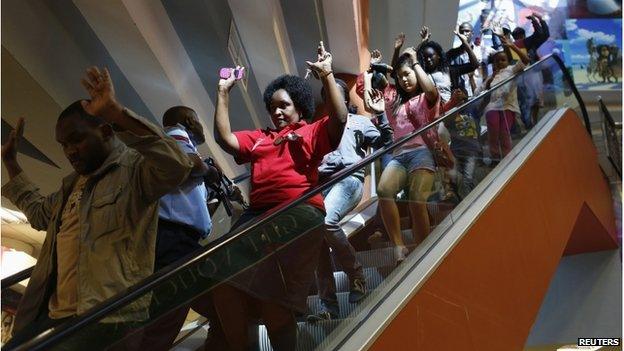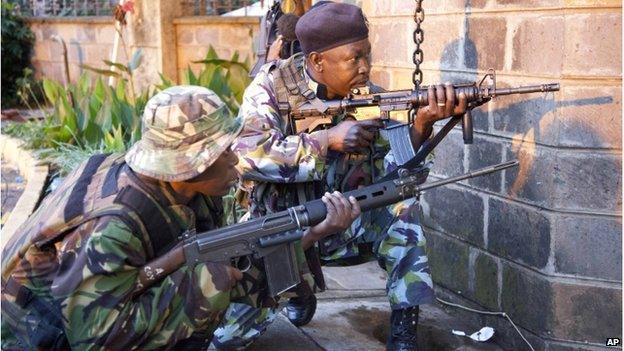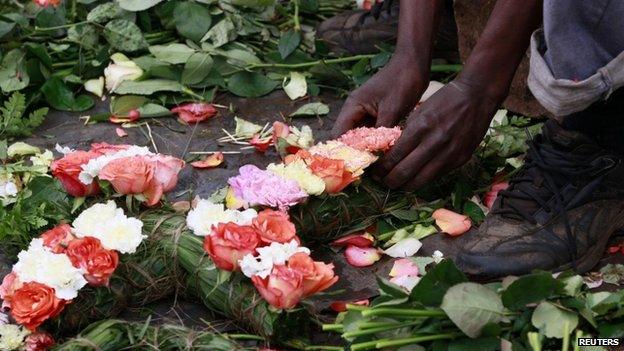Horror and heroism in Nairobi's Westgate mall siege
- Published

At least 67 people are known to have died in a four-day siege of the Westgate shopping centre in Kenya's capital city.
For many in Nairobi, leisure time revolves around the shopping Mall. Westgate is my local complex - or one of them.
This is a city where an increasingly affluent middle class - and large numbers of relatively wealthy expats - live alongside an even larger group of people for whom a coffee in one of Westgate's cafes would set them back a day's wages or more.
But for those who can afford it, Westgate offers restaurants and shops, a supermarket, even a casino and a cinema.
I stop by Westgate on average about three times a week - mostly to do my grocery shopping. But sometimes to pop into the ArtCaffe for an espresso, or to rent a video from the store on the second floor.
I was not there last Saturday at noon, when a group of men with guns walked confidently up the steps to the main entrance and started shooting.
I was abroad. And so, for me, the immediate aftermath of the attack unfolded in a series of still pictures, which emerged on the internet as I made my way back to Nairobi.
A young woman folded into a shopping trolley, being wheeled to safety, bleeding and grimacing with pain, her head resting on a 12-pack of toilet roll.
Another woman, frozen in the act of jumping out of the air-vent of a sushi restaurant, where she had been hiding for several hours.
A group of cinema-goers, emerging dazed and blinking into the light, descending an escalator, their hands held rigidly in the air.
And a mother, her face stretched in fear, carrying her toddler as she runs over shattered glass into the arms of a pistol-toting security officer.
By the time I got to the scene, 24 hours later, Westgate had been cordoned off. Inside, the gunmen were holding hostages. One could only imagine under what conditions.
Those who had managed to escape described scenes of bodies sprawled lifeless over their lunch plates.
The attackers had apparently called on Muslims to identify themselves. If they passed the test - by reciting verses from the Koran, or identifying the name of the mother of the Prophet, they were allowed to go.
Some of the tales of horror and heroism that emerged as the standoff continued, seemed rooted in little more than the fevered imagination of the bystanders who gathered outside the shopping centre.

With a knowing look, one man asked me whether I had heard about the decapitated body that had been thrown out of a window. I had not, and no-one I had spoken to had seen any evidence of that.
A picture emerged of a young European boy, clutching a Mars bar, standing next to a dead body. According to some newspapers, this four-year-old British child had confronted one of the gunmen.
"You are a very bad man," he apparently told him. To which the attacker responded: "Please forgive me, we are not monsters," and handed him the chocolate.
It was not clear exactly how much of this was true. But there were plenty real of stories of extraordinary bravery, and callousness.
Two days after the attack I met Kamal Kaur. She had been on one of the upper floors of the complex, hosting a cookery competition for 30 or so children.
When the attack began, they all huddled together in a corner. Then, a man came with a hand grenade. He rolled it across the floor towards the group of kids. Then he fired off a shot.
Kamal was unhurt. Her son and daughter, aged eight and 12, were injured.
But right next to her, a young boy, was fatally wounded.

Traders have been selling flowers outside Nairobi's City Mortuary for the victims who were killed in the attack
"I know it is not my fault," she told me. "But I wish I could have done more."
She described her feeling of helplessness as the child bled profusely and his breathing got heavier and heavier.
"All I could do was stroke his head," she said, "and then his body started twitching and I knew that, this is it, he is not going to make it.
"Eventually he stopped moving, and I could do nothing to help him."
The siege ended in a series of stutters. Journalists and soldiers gathered outside the mall ducked for cover as periodic bursts of gunfire erupted.
We heard loud blasts coming from inside, and then a thick plume of smoke rising over the building into the sky.
As I write, forensic teams are combing through the complex to try to piece together exactly what happened and how.
From Our Own Correspondent, external: Listen online or download the podcast.
BBC Radio 4: Saturdays at 11:30 and some Thursdays at 11:00
BBC World Service: Short editions Monday-Friday - see World Service programme schedule.
You can follow the Magazine on Twitter, external and on Facebook, external